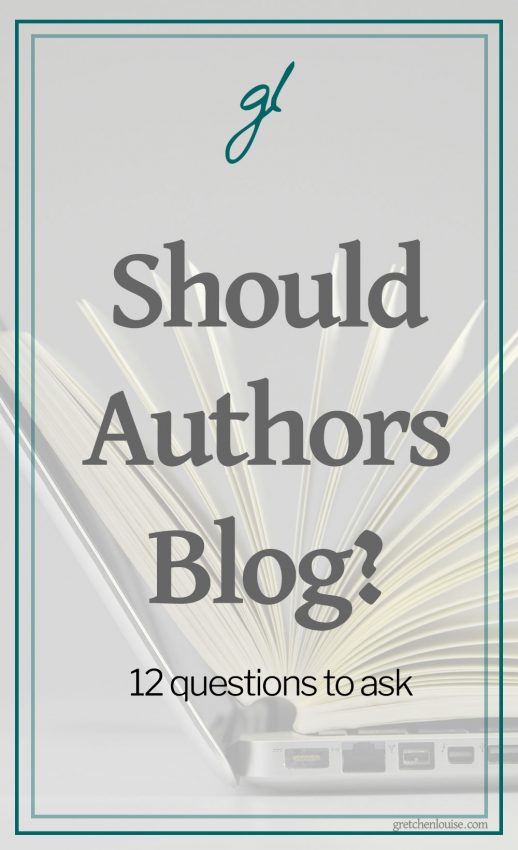Should Authors Blog?
For the past ten years, the publishing industry has been changing almost as fast as the world of social media. It’s gone from authors asking, “What is a blog?” to publishers demanding, “How big is your blogging platform?” back to authors asking, “Do I have to blog?” And as fast-paced as the industry is, the formula that worked last week or last year may not work tomorrow.
There are no hard and fast answers to the question “Should Authors Blog?” It varies for each author. Every author should be online. But not every author should blog.
Here are twelve questions to ask as you consider the real question: “Should I, as an author, blog?”
1. Do I already have an established platform that I love blogging for?
If you’re like many bloggers, you started out with blogging as your end goal, and a book deal came along as a great bonus. In that case, you probably have a loyal blog readership: don’t disappoint them by abandoning the very thing that brought you together in the first place. However, if you’re starting from square one just because you’ve heard authors should blog, read on.
2. Do I have the technical knowledge necessary to make my blog as professional as my books?
For an established, professional author, it is better to have no blog than to have a blog that is mediocre at best. If you can’t afford to hire help to make your blog look as professional as your published works, then don’t blog.
3. Do I know how to blog or have the time to invest in learning how?
You can hire a developer to maintain the technical aspects of your site, but writing a blog post requires more than just the typical Microsoft Word formatting of headings and bullet points. There are links to insert. Royalty-free, copyright-free images to find, resize, edit, and add. Be prepared to attend workshops and read books on blogging–or hire a virtual assistant to prepare your words for the internet before they are published.
4. Does my writing require editing before it is published?
Your blog posts should reflect the quality of your books. Be brave. Draft up a few blog posts and send them to your editor. If you are a writer who requires an editor, then hire a pre-publish post editor or don’t blog. Don’t disappoint your fans by blogging in a way that doesn’t fulfill what your books promised. Don’t scare away potential readers by publishing blog posts that don’t show the quality of your published works.
5. Does my agent/publisher recommend/require me to blog or am I self-published?
If you are self-published, you are your own boss. You alone know best what has worked for you, and you are free to experiment to see what will continue to work to make you stand out from the crowd. If you’re working with an agent or publisher, they will probably have strong opinions one way or another. One agent might want you to build a sizable platform before they will ever look at your manuscript; another publisher might prefer to be in control of your professional online presence and won’t want you to risk messing it up by starting a blog.
6. Do I write fiction or non-fiction?
Your chosen genre has great influence on whether or not you should be spending any time blogging. Non-fiction authors can expound endlessly upon the topics in their books; fiction authors have to get creative when they blog. Non-fiction authors should write compelling blog posts that generate interest in their books; fiction authors might do better to spend their time writing the next book in the series.
7. Do I get more return for my time writing blog posts or writing books?
If your website is your primary means of selling your books, then a blog might be the best method to bring potential buyers to your website on an ongoing basis. But if you have a loyal following of fans waiting to buy your next book, then why waste your time writing blog posts that don’t necessarily bring any income?
8. Do I have an established platform on my own blog or should I be writing guest posts for somewhere else?
Writing guest posts for other blogs is always a great way to further your reach. But if you don’t have a blog readership established, it might be that you would do better to write guest posts for other blogs than to try to further the reach of your own blog at all. Whether or not you have your own blog, be sure to emphasize a critical call to action at the end of your guest posts. Make guest posts pay by asking readers to buy your book or subscribe to your email list, no matter whether you have a blog to send them to.
9. Does blogging provide the best avenue for me to get to know my readers?
Blogging can be a great way for you to get instant feedback on topics, to explore different angles to see what resonates with your readers before you put it into book form. But blogging isn’t the only way to do that. Maybe you can “do” social media but blogging overwhelms you. That’s fine–use what works for you to get in touch with your books’ readers and potential readers.
10. Does my target audience read blogs?
Know your audience. If you write for young moms, you’re writing for an audience that reads and writes blogs all the time. If you write for teens or tweens, you might do better to spend your time on social media rather than blogging. It’s worth the effort to go where your book’s potential readers are, even if it’s not what comes most naturally to you.
11. Do I need a blog or can an email list accomplish the same thing with better results?
While social media networks ebb and flow, getting permission to get in someone’s email inbox remains the key to online marketing. An email list allows you to have interaction with your readers, keep them informed of your publishing news (whether it’s a guest post or a new book), and gives a space for your own creative writing once in a while. All without the headache of Pinterest-friendly images and database backups.
12. Does blogging keep me from writing?
Does your blogging take all the time you should be using to craft your manuscript? Or does it provide an additional creative outlet that helps fuel the energy for your book? Author Emily P. Freeman likens blogging to flying a helicopter: you can drop down briefly, write a blog post, and be done. Writing a book, however, is more like flying in an airplane, says Emily: it necessitates large chunks of time to even get off the runway, let alone gain flying altitude and cover some distance. If you’re spending all your time helicopter blogging so that you’re never even able to board the jet plane, you need to reconsider your end goals.
Why are you blogging? Is blogging your end goal? Or is a finished manuscript what you’re really aiming for? Is blogging selling books? Or is blogging keeping you from writing the book on your fans’ wishlist?
Related posts to provoke thought and discussion:
- “It’s Time for (Many) Experienced Writers to Stop Blogging” by L. L. Barkat
- Scribes United Interview with L.L. Barkat
- “Should All Authors Blog?” by Rachelle Gardner
- “3 Reasons for Writers to Have a Blog … and 3 Reasons Not To” by Joanna Penn
- “Why Don’t Publishers Believe in Author Websites?” by Jane Friedman
- “For the Weary Blogger” by Gretchen Louise




Great article, really enjoyed it!
For non-fiction, blogging I think is a must, since you can start using keywords for SEO and get some traction that way.
For fiction authors it’s a bit harder, I actually wrote an article about it here:
http://publishingaddict.com/what-to-write-on-your-author-blog/
But here are some creative ideas:
> Review books in your niche on your blog after you have read them, preferably start with the most popular books.
> FUTURE TOPICS – list ideas or topics you wish to tackle in the future in your books
> BOOK ENDINGS – talk about alternate book endings
> CHARACTERS – interview your book characters about current events
> FAN – Interview fans about why they liked your books
This is a great article! I pinned it so I can go back over it. There’s a lot of pressure to build a platform so I started a blog and love it, but have found it’s taking a lot of time away from working on another manuscript. Lots to consider.
Gretchen, these are such great points…all of them! I will go back through these one by one and do some re-evaluating. I do find it harder to blog now that I’m working on another manuscript.
thanks for sharing this.
Jan
Thank you, Jan! I think the most helpful thing for me is simply to view blogging as an optional thing, that I can do when I want to. When it’s something I “have” to do, I don’t want to do it. 🙂
For me it comes down to #12. I still blog, just not as much. Thanks for the great questions. I’ll be considering them the rest of the week.
#12 is the one I struggle with, too, except that the technical aspects of my blog keep me from actually blogging as much as I’d like! It’s always a balancing act, isn’t it?
I’ve decided that I need a miniMe to keep up with it all!
As always, great info and good things to ponder, miss G.
Blessings.
The landscape of social media is always changing, isn’t it? You never know what it’s going to do next!
Thanks for commenting, Darlene.